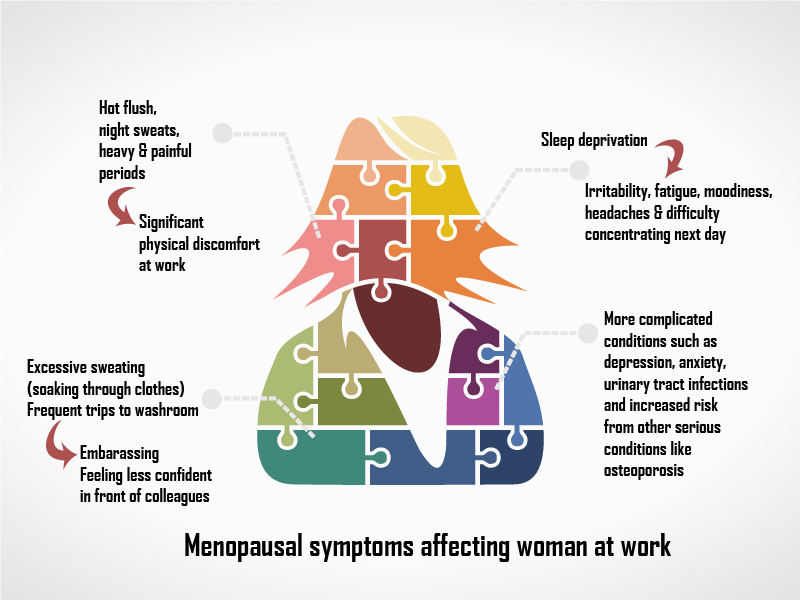Menopause hits women around the age of fifty, when hormone production collapses, as does ovulation, and therefore menstruation stops. Eight out of ten women experience this. Menopause is almost always a natural process, but it affects women at different ages and in different ways: some go through it without any problems while others suffer severely.
- Fatigue: Loss of concentration or poor memory:
- Hot flashes, ugly redness on the face and neck, sweating and shivering, sometimes several times an hour.
- Joint or muscle pain
- Bladder weakness:
- Perimenopause can also cause heavy or prolonged bleeding, forcing you to change towels or tampons frequently, not to mention the worry of leaking in front of co-workers.
British television channel Channel 4 introduced specific measures for its menopausal employees. Indeed for 94% of women surveyed by the menopause treatment centre Newson Health, published in July 2019, reported menopause symptoms have had a direct impact on their work and a deterioration in their performance, which they were unable to hide from their colleagues. Symptoms that have forced them to take frequent absences, part-time work or sick leave. This is the case for one in eight of the women interviewed. There is no shortage of polls on this issue, with often similar results and yet why is it rarely discussed openly, honestly in organisations?
“Nearly 80% of women experience some symptoms of menopause, which occurs when ovulation stops due to a collapse in hormone production. One in four women is prone to severe symptoms, such as anxiety and depression”. The Guardian
Historically and across cultures, menstruation menopause is a taboo subject. Even though in Japan, Taiwan, South Korea or Indonesia offer “menstrual leave”, which allows women to take a paid day off for their period, the issue of menopause remains mostly ignored and taboo in the world of work, (Le Figaro noted in 2016).
Many women have to deal with the side effects of menopause in the workplace – most often in silence. And the physical effects of menopause, plus psychological symptoms can manifest themselves in depression, anxiety and high levels of stress affecting women’s confidence at work.
So what can we do?
Should menopause be considered the same as an illness or pregnancy by companies? On an organisational level, depending on the symptoms, all your people need to care and compassion. Menopausal women are no different.
I see that some clear measures and systems are being put into place. And still the paradox of not having a “menopause policy”, given that demographic ageing is a long-term trend in Europe is intriguing and insightful.
However, as a step forward, I believe it is up the organisation to normalise the menopause by talking about it. There may be some discomfort to talk about at first, but silence around the topic pushes it back into the background.
As a menopausal woman, I too have been guilty by not discussing it openly or minimising my symptoms for fear of being perceived as “weak” especially when I was the coach, the authority in the room, the one who “had” to be ok. Yet, I have seen that once I explain why I have to window open in the middle of winter because of hot flushes, or that I have sleepless nights due to the menopause it has always been accepted. Sometimes with empathy and sometimes with curiosity ( yes because 99% of the time I am the only women in the room, but that’s another story).
Hence I encourage you all to talk about it. Small actions make a significant impact. When you practice small actions, you’re not alone. You’re helping, supporting and acknowledging your peers and colleagues. You are normalising difficult subjects for people who want to do the same thing as you; to be open about the important and visible topic, which everyone is aware of, but which isn’t discussed.


